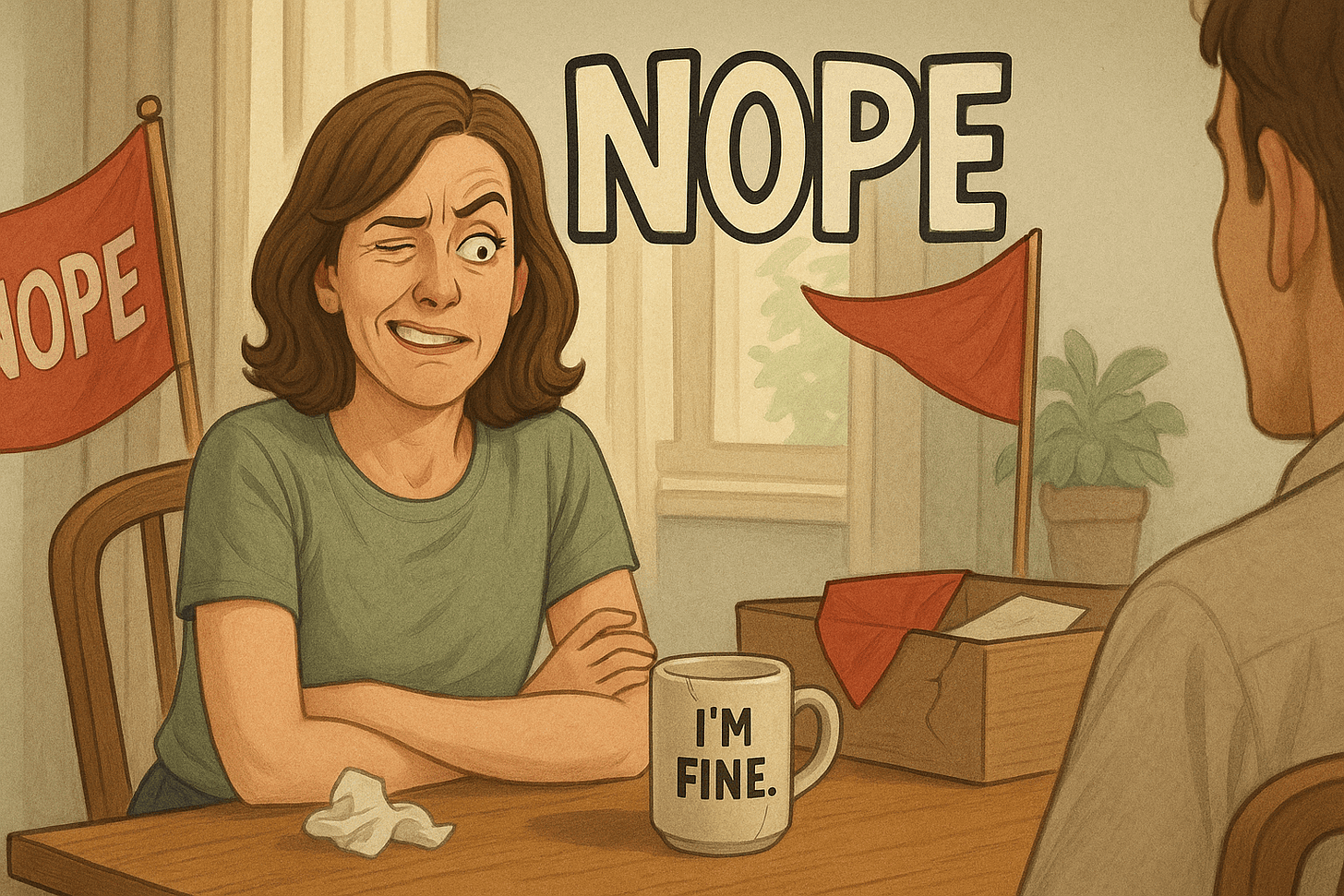How I Set Boundaries Without Apologizing (Anymore)
Because protecting your peace isn’t rude — it’s revolutionary.
I didn’t learn boundaries in childhood.
I learned how to read a room.
How to stay useful.
How to disappear without making anyone uncomfortable.
For most of my life, I thought love was something you earned by staying available.
Not just physically, emotionally, energetically. Always ready, always open, always trying.
I wasn’t afraid of people being mad at me. I was afraid they wouldn’t love me if I said no. And I waited too long to test that theory.
I kept saying yes when I wanted to say no.
I ignored the pit in my stomach.
I told myself I could handle it. That it wasn’t that big a deal.
Until everything in me stopped cooperating.
My thoughts looped like a skipping record.
My body started panicking at random.
I couldn’t sleep. I couldn’t rest. I was angry all the time, and I didn’t know who to be mad at.
That’s when I understood what no one had taught me:
If you don’t set the boundary, your body will do it for you.
I wasn’t just overwhelmed. I was over-accessible.
And no amount of bubble baths or deep breathing was going to fix what years of self-erasure had wired into my system.
This isn’t a guide to setting perfect boundaries.
This is me telling the truth about what happened when I didn’t.
Inside this post:
The phrases I actually use when I need to hold the line
A story about the cost of waiting too long
A printable tool you can keep close when your “no” gets shaky
If you’ve ever tied your worth to being needed…
If you’re tired of folding yourself into something more palatable…
If you’re not sure where you went, but you know you miss yourself…
You’re in the right place.
When My Body Called Bullsh*t
I didn’t wake up one day and realize I needed boundaries.
I spiraled.
It happened slowly, then all at once, like most things do.
There wasn’t a single moment I can point to. It was more like an ongoing override:
Saying yes to one more thing when I hadn’t eaten.
Holding space for someone else’s grief when mine hadn’t even been named.
Letting the texts pile up because I couldn’t keep being the person who held everyone together.
But I still tried. I kept showing up. Kept being “nice.”
Kept saying, “No worries at all,” while my jaw clenched and my chest tightened, and my sleep got strange.
My anxiety wasn’t new. But the way it started to live in me was.
It wasn’t sharp and situational anymore. It was a constant buzz, like my body had stopped trusting me to listen, so it screamed all the time.
I was exhausted but couldn’t rest. I was angry but didn’t know where to put it. I was forgetting things, floating, losing my edges. That’s when I knew: this wasn’t burnout.
It was betrayal.
I had built a life where everyone else came first, and I had done it to myself.
Not because I’m weak or broken.
Because somewhere along the way, I learned that to be loved, I had to be useful.
And when I couldn’t be useful anymore, when I was too tired, too shut down, too unwell, I was terrified of what that meant.
That’s when boundaries stopped being an optional skill and became a survival strategy.
Not a wall to keep people out, but a way to stop leaking all the parts of me I still needed to keep.
I wasn’t ready. I was desperate.
And that was enough to begin.
A Note on Over-Explaining (and Why I Stopped)
For a long time, I thought that if I could explain my no well enough, people wouldn’t get upset.
If I made it reasonable, they’d accept it.
If I made it selfless, I’d still feel worthy.
I said things like:
“It’s not that I don’t want to…”
“I’m so sorry, I just have a lot going on…”
“I hope you understand, because I really value you, and—”
That’s not a boundary. That’s a negotiation. And it always left me wide open. Because the more you explain, the more you invite someone to push back. To try to make it make sense to them instead of for you.
A boundary isn’t a performance. It’s not a request for feedback. It’s not a story you owe. You can be clear and still be kind. You can say no and let that be the end of the sentence.
And if someone pulls away because you didn’t wrap your no in flowers? That’s proof the boundary was necessary.
When I Tried to Bargain With Myself Instead
Even when I started practicing boundaries, I still negotiated with myself.
“Maybe just this one time.”
“Maybe I’m overreacting.”
“What if I offer a softer version of no?”
“I’ll do it, but only for a few minutes…”
I kept trying to walk the line between keeping the peace and keeping myself intact.
But I wasn’t overreacting. I was overextending. Those bargains weren’t strategy, they were fear.
I didn’t want to disappoint people. I didn’t want to feel the sting of rejection. I didn’t want someone to think I was selfish.
So I offered watered-down no’s that didn’t protect anything. I shaved off the parts of the truth that made me uncomfortable. I made myself smaller so I could keep belonging.
But here’s what I know now:
If someone requires you to abandon yourself in order to stay close, that’s not connection. That’s a performance.
I don’t negotiate with my no anymore. If it costs me my peace, the answer is simple.
The Scripts I Use When I’m Not Apologizing Anymore
These aren’t “perfect” phrases.
They’re real words I use depending on my energy, the relationship, and whether I feel tender or done.
Choose what fits. Adapt what doesn’t.
Save the snarky ones for when you’re one text away from losing it.
I don’t believe in one-size-fits-all boundaries.
Some days, I have the capacity to be soft. Other days, it’s a hard no with zero frills.
These scripts are here for all your moods. The generous ones, the fried ones, the quietly done ones.
When Someone Says: “Can I pick your brain real quick?”
Direct: “I don’t offer free consults outside of sessions anymore.”
Gentle: “I’ve shifted how I give my time, and I’m only offering paid guidance now. Thanks for understanding.”
Snarky: “Sure! Right after I pick yours, edit your resume, and send you an invoice.”
When Someone Asks for Something and You’re At Capacity
Direct: “That doesn’t work for me.”
Gentle: “I’m at my limit right now and can’t take anything else on.”
Snarky: “I’m currently accepting requests from no one. Try again next season.”
When You’re Done Playing a Role
Direct: “I’m no longer available to be that person for you.”
Gentle: “I’ve outgrown that role, and I’m stepping into something different.”
Snarky: “Retired from that version of me. I wish her well, but she’s not taking requests.”
When They Keep Pushing After You Already Said No
Direct: “I’ve already answered this. I’m not available to revisit it.”
Gentle: “I know this may be hard to hear, but my answer hasn’t changed.”
Snarky:
“This is my boundary, not a group project.”
When a Friend Expects Something You Can’t Give
Direct: “That’s not something I can offer, even though I care about you.”
Gentle: “I love you, and this is a place I need to pull back.”
Snarky: “My friendship doesn’t come with unlimited emotional storage.”
When You Need Time Before Answering a Request
Direct: “I need time to think about that. I’ll let you know.”
Gentle: “Let me sit with that and I’ll get back to you soon.”
Snarky: “I’m currently in decision-making triage. You’ll hear from me if it makes the cut.”
When You’re Breaking an Old Pattern
Direct: “In the past, I would’ve said yes. I’m not doing that anymore.”
Gentle: “I’m trying to make different choices that honor my limits, so I need to say no here.”
Snarky: “New boundary just dropped. Sorry if you missed the patch notes.”
When They Keep Texting Even Though You Asked for Email
Direct: “Please send this to my email. I’m not checking texts for work.”
Gentle: “I know texting’s easier, but I’m asking everyone to stick to email so I can stay organized.”
Snarky: “My brain doesn’t file texts. Try email or the abyss — your call.”
When They Say: “I could’ve figured it out, but calling you was faster.”
Direct: “I’m not available to be your shortcut. I trust you’ve got this.”
Gentle: “I get that — but I’m being protective of my time, so I can’t jump in.”
Snarky: “I’m not your tech support today. Try Googling it like the rest of us mortals.”
Bonus: The Sacred No Printable
You don’t always have the words in the moment.
You freeze. You fawn. You explain. You say yes and regret it immediately.
This is your reminder in printable form.
What’s inside:
Real boundary phrases in multiple tones
A personal capacity check-in before you respond
Space to write your own go-to “no”
Quiet mantras to keep close.
Final Note: You’re Allowed to Be Whole
Every time I held back my no, I thought I was protecting the relationship. What I was really doing was disappearing.
Setting boundaries doesn’t mean you love people less. It means you finally love yourself enough to stop leaking out of your own life.
You don’t owe access. You don’t owe explanation. You don’t owe anyone your exhaustion just to feel worthy.
You are allowed to say no without guilt. You are allowed to rest without permission.
You are allowed to be whole.
Love today,
Heather 🌸
I'd love to hear from you:
What’s a boundary you’re learning to hold — or one you wish you could?
Drop it in the comments. I read every single one.



